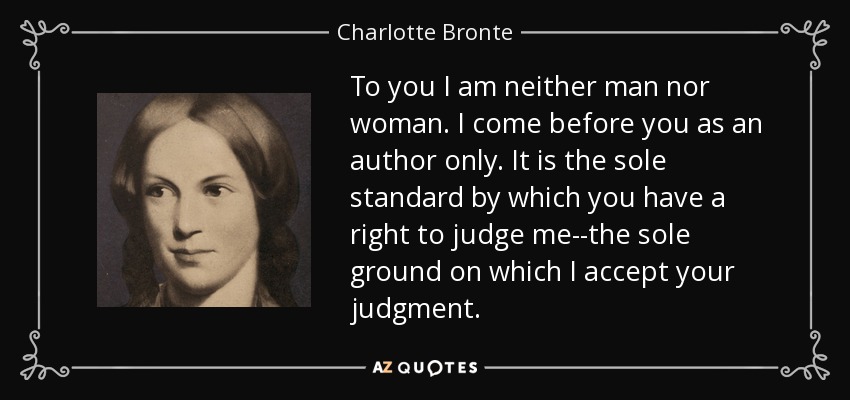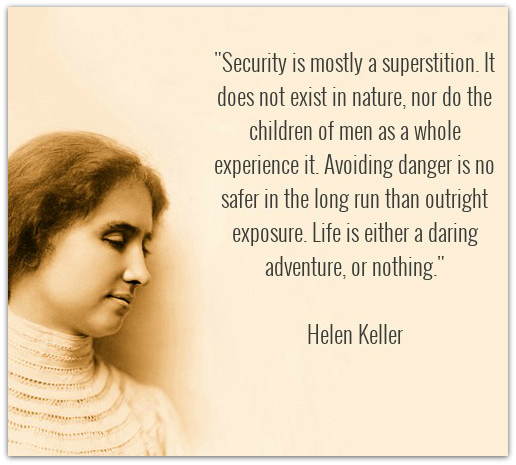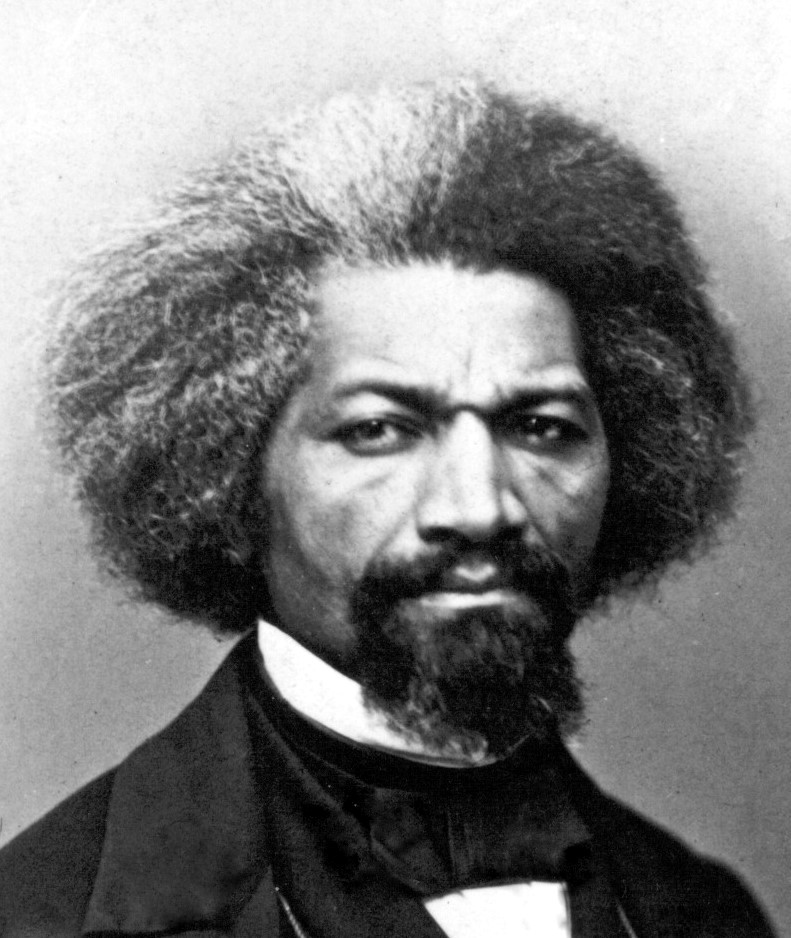Martian?
Even today, some readers are unaware that George is a Georgette.
Yep. That's the way she'd have preferred it, I think. Currer Bell (later revealed as Charlotte Bronte) as well:

Which speaks to your point in another thread.
Martian?
Even today, some readers are unaware that George is a Georgette.
Yep. That's the way she'd have preferred it, I think. Currer Bell (later revealed as Charlotte Bronte) as well:

Which speaks to your point in another thread.
Sperm Whale
![]()
Hail to the Chief!
"A bow-shot from her bower-eaves,
He rode between the barley sheaves,
The sun came dazzling thro' the leaves,
And flamed upon the brazen greaves
Of bold Sir Lancelot."
Moby-Dick
Marian to her friends... ![]()
A barba stulti discit tonsor.
“I like not only to be loved, but also to be told that I am loved. I am not sure that you are of the same mind. But the realm of silence is large enough beyond the grave. This is the world of light and speech, and I shall take leave to tell you that you are very dear.” ― George Eliot
“Blessed is the man who, having nothing to say, abstains from giving us wordy evidence of the fact.” ― George Eliot
“A friend is one to whom one may pour out the contents of one's heart, chaff and grain together, knowing that gentle hands will take and sift it, keep what is worth keeping, and with a breath of kindness, blow the rest away.” ― George Eliot
Indubitably! This wit acquiesces to your wit. To wit, barba non facit philosophum. ![]()
Sorry, we only accept cash.
"This habit of assimilating what pleased me and giving it out again as my own appears in much of my early correspondence and my first attempts at writing. In a composition which I wrote about the old cities of Greece and Italy, I borrowed my glowing descriptions, with variations, from sources I have forgotten. I knew Mr. Anagnos's great love of antiquity and his enthusiastic appreciation of all beautiful sentiments about Italy and Greece. I therefore gathered from all the books I read every bit of poetry or of history that I thought would give him pleasure. Mr. Anagnos, in speaking of my composition on the cities, has said, 'These ideas are poetic in their essence.' But I do not understand how he ever thought a blind and deaf child of eleven could have invented them. Yet I cannot think that because I did not originate the ideas, my little composition is therefore quite devoid of interest. It shows me that I could express my appreciation of beautiful and poetic ideas in clear and animated language.
"Those early compositions were mental gymnastics. I was learning, as all young and inexperienced persons learn, by assimilation and imitation, to put ideas into words. Everything I found in books that pleased me I retained in my memory, consciously or unconsciously, and adapted it. The young writer, as Stevenson has said, instinctively tries to copy whatever seems most admirable, and he shifts his admiration with astonishing versatility. It is only after years of this sort of practice that even great men have learned to marshal the legion of words which come thronging through every byway of the mind.
"I am afraid I have not yet completed this process. It is certain that I cannot always distinguish my own thoughts from those I read, because what I read becomes the very substance and texture of my mind. Consequently, in nearly all that I write, I produce something which very much resembles the crazy patchwork I used to make when I first learned to sew. This patchwork was made of all sorts of odds and ends—pretty bits of silk and velvet; but the coarse pieces that were not pleasant to touch always predominated. Likewise my compositions are made up of crude notions of my own, inlaid with the brighter thoughts and riper opinions of the authors I have read. It seems to me that the great difficulty of writing is to make the language of the educated mind express our confused ideas, half feelings, half thoughts, when we are little more than bundles of instinctive tendencies. Trying to write is very much like trying to put a Chinese puzzle together. We have a pattern in mind which we wish to work out in words; but the words will not fit the spaces, or, if they do, they will not match the design. But we keep on trying because we know that others have succeeded, and we are not willing to acknowledge defeat.
"'There is no way to become original, except to be born so,' says Stevenson, and although I may not be original, I hope sometime to outgrow my artificial, periwigged compositions. Then, perhaps, my own thoughts and experiences will come to the surface."
- Helen Keller, 1902.

Currently reading. This excerpt is from Chapter Four of The Story of My Life. Wow she is inspiring. As a child she composed a story which was published and later discovered to be very similar to the work of another writer. She had no memory of having ever been read the story. As a young girl without sight or hearing, she was attempting to become a writer. She had absorbed the language of a story told to her long before. She reproduced it as her own work because so many of her impressions would become muddled together at the time: she couldn't distinguish her own thoughts and ideas from those she'd read, because for her life was a silent, dark world, and the impressions all ran together. This situation devastated her so entirely she never tried to write fiction again. But she describes it so well: the process of learning from what we appreciate in literature, and beginning to attempt to try to find our own voice within those rhythms and sounds. I can't imagine attempting to do such a thing without any sight or sound to experience those rhythms the only way I can imagine experiencing them -- to have them made concrete for me through my senses. I think it's incredible she tried. It's such a shame the reaction so devastated her.


(I'm currently reading her The Story of My Life.)
Not sure I can properly express the greatness that is George Eliot...
From my perspective your post was highly offensive; hate speech, if you like.
Yes, you've illustrated your perspective sufficiently, as I've already said.
... as to the sentiment of the "horrific world" Douglass spoke against ....
... because of its enormous superiority to anywhere else ...
This is a matter of perspective.
“That element of tragedy which lies in the very fact of frequency, has not yet wrought itself into the coarse emotion of mankind; and perhaps our frames could hardly bear much of it. If we had a keen vision and feeling of all ordinary human life, it would be like hearing the grass grow and the squirrel’s heart beat, and we should die of that roar which lies on the other side of silence. As it is, the quickest of us walk about well wadded with stupidity.” ― George Eliot, Middlemarch (currently reading)
"Swine" then.
Your shallow contribution here throws integrity into relief, serving as a living reminder of the horrific world this man spoke against. Your voice is small, your words hollow, your contribution like the scurrying of a rat too arrogant to realize he is insignificant.
Please, do go on. You serve as illustration.
I've started doing yoga. Apparently my breath is made out of moonlight, and so is my life. (According to the yoga person.)
I had no idea.
One of my favorite writers. Read by James Earl Jones.

first kiss
cupid's bow
I've finished David Copperfield finally. LOVED it. I'll just copy & paste what I wrote on Goodreads, if everyone will pardon me:
"I've spent several weeks slowly reading through this book. If it weren't for A Christmas Carol, this would be my favorite by Dickens. It's a long book. A sink back and feel cozy book. Little David finds himself alone in the world, half-heartedly and cruelly raised by a horrific man named Murdstone. He's sent to boarding school and the guy who runs the place is horrible to little boys, and then the really respected kid at the school (Steerforth) befriends little David, and he has to stay up nearly all night reciting books to him.
The dramatic question seems to be -- will this poor little fellow thrive despite his awful circumstances, and keep his heart, and if so, how? Dickens answers this question by the end of the book, but the novel isn't tightly plotted. It's more a series of plots involving characters who have passed through or contributed to David's life, while he steadily goes on, loving some, appalled by some, and slapping one square in the face. Much of the novel is spent sitting in rooms with incredibly weird and hilarious characters, visiting, discussing the past, and trying to relate to one another the goings-on off the page.
I loved little David. He's so quiet and kind and observant. I pretty much wanted to scoop him up and hug him for the whole first half of the book. I didn't find the second half of the book as interesting, because I think some of the pathos is lost when David grows up. I still care what happens, but not in a "come and give me a hug, you poor little fellow" kind of way. But it is good to see him grow up, and I love that we're with him for so long. The tension is pretty much gone by the second half of the book. There are all sorts of plot twists with other characters, but they're almost always delivered to the reader after the fact in conversation.
There are a wealth of incredible characters in this novel, and that's (for me) what makes this book quite excellent. I LOVE Aunt Trotwood. She is so smart and kind, and possibly my favorite Dickens character so far. DO NOT CROSS HER LAWN ON A DONKEY. I love waiting for what she'll say next. I also like Mr. Micawber. He always has to write everything in a dignified and long-winded letter -- even something mundane like "pass the salt." ![]() Mrs. Micawber will NEVER LEAVE MR. MICAWBER. Also, the villain in the story! He's very 'umble. Mrs. Gummidge. And Dora. She's so sweet and well-meaning. She wants so much to be what she isn't. I love the scene where she sits with David as he writes, so happy to hold the pen for him. Agnes is also a great character. I love that David craves her rational mind in his life.
Mrs. Micawber will NEVER LEAVE MR. MICAWBER. Also, the villain in the story! He's very 'umble. Mrs. Gummidge. And Dora. She's so sweet and well-meaning. She wants so much to be what she isn't. I love the scene where she sits with David as he writes, so happy to hold the pen for him. Agnes is also a great character. I love that David craves her rational mind in his life.
In conclusion, I loved the book! I'm glad I spent several weeks with it, but I'm a little sad to say goodbye. I've been with the characters for so long. This novel is about the people who made David. The people who helped him, changed him, held him up, and pushed him forward. Just typing that makes me a little teary-eyed. x
(Also, Mr. Dickens should have written a whole novel starring Aunt Trotwood.)"
Now I'm beginning Middlemarch by George Eliot, and per our conversation (above) about novels on historical women, I'm reading Mary: Mrs. A. Lincoln by Janis Cooke Newman. So far it is fabulous! The story leaps off the page. Voice? Yes.
Here's the description from Goodreads:
"Mary Todd Lincoln is one of history’s most misunderstood and enigmatic women. The first president’s wife to be called First Lady, she was a political strategist, a supporter of emancipation, and a mother who survived the loss of three children and the assassination of her beloved husband. Yet she also ran her family into debt, held seances in the White House, and was committed to an insane asylum. In Janis Cooke Newman’s debut novel, Mary Todd Lincoln shares the story of her life in her own words. Writing from Bellevue Place asylum, she takes readers from her tempestuous childhood in a slaveholding Southern family through the years after her husband’s death. A dramatic tale filled with passion and depression, poverty and ridicule, infidelity and redemption, Mary allows us entry into the inner, intimate world of this brave and fascinating woman."
x
“There was nothing about her story remarkable other than that it was her life.”
― Charles Frazier, Cold Mountain
“There is an abiding beauty which may be appreciated by those who will see things as they are and who will ask for no reward except to see.”
― Vera Brittain
I found this really interesting discussion against the novel online (contains spoilers immediately upon clicking). I think the speaker of the video makes a lot of really interesting points. I really like the way he compares America's reception of To Kill a Mockingbird versus Go Set a Watchman. Really solid remarks, I think. (From what I watched. I skimmed a bit.) He seems to echo some of what Dill said above. He mentions the way Lee emphasizes Boo's whiteness at the end of the novel: I'd missed that. (SPOILER FOLLOWS) Robinson is black and he dies; Boo is white and he is spared. I think the speaker fails, though, to consider Lee may have done this on purpose, not to condone it, but to bring it to light. He (may) also fail to consider that Lee wrote for a middlebrow audience, not to romanticize the issue, but to attempt to reach the middling sorts. :-)
"Boo had drifted to a corner of the room, where he stood with his chin up, peering from a distance at Jem. I took him by the hand, a hand surprisingly warm for its whiteness. I tugged him a little, and he allowed me to lead him to Jem’s bed."
I still love the book. I love it because I love it. I still haven't bothered to reread it and have anything intelligent to say in this thread -- evidence perhaps that I don't quite love it enough. ![]() I like to see it challenged and beaten about. I'm not sure I'll ever consider it beneath the effort.
I like to see it challenged and beaten about. I'm not sure I'll ever consider it beneath the effort.